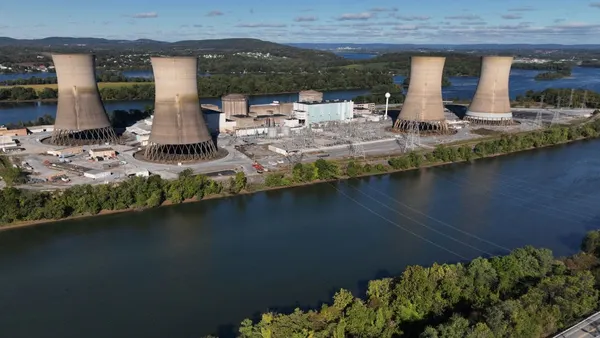Dive Brief:
- The Federal Energy Regulatory Commission should reject an unprecedented transmission service agreement between PECO Energy, an Exelon utility, and Amazon Data Services until the companies show a planned data center in Pennsylvania won’t increase energy and capacity costs for retail electric customers or hurt grid reliability, according to the PJM Interconnection’s market monitor.
- The agreement fails to address how Amazon’s planned data center in Falls Township, Pennsylvania, could affect capacity and energy costs for ratepayers in PJM’s footprint, Monitoring Analytics, PJM’s market monitor said in a Tuesday filing at FERC. Monitoring Analytics estimates that existing and planned data centers accounted for $16.6 billion of the $30.8 billion in revenue from PJM’s last two capacity auctions.
- “Despite the protections included in the [transmission service agreement], it is not just and reasonable to allow the interconnection of this large new data center load when it has not been demonstrated that either PECO or PJM has the capacity available to reliably serve this load,” the market monitor said.
Dive Insight:
FERC’s review of the PECO-Amazon agreement comes amid growing scrutiny of how data centers can raise electricity bills for consumers through increased transmission costs and higher energy and capacity prices.
PECO on Sept. 23 asked FERC to approve a transmission service agreement that outlines how Amazon will pay for any grid upgrades that are needed to supply power to the planned data center in Falls Township.
The agreement includes provisions designed to protect utility customers from those costs, including in the case that the data center complex isn’t built as planned, according to the Philadelphia-based utility.
“The TSA’s terms and conditions include a defined ramp, a customer facility readiness obligation, credit obligations, committed revenue contributions, shortfall payments if the data center’s usage and resulting transmission revenues miss commitments, and a published termination‑fee schedule,” PECO said in its redacted application. “Together, these protections reflect Amazon’s commitment to the project and guard against shifting costs and risks to other customers.”
The outcome of FERC’s review of the agreement could have “significant regulatory and policy implications” for large load customers across the United States, and could affect the Trump administration’s goal of “winning the AI race,” Monarch Energy Development, a data center company, said in comments to FERC on Tuesday.
A “committed revenue contribution” provision in the PECO-Amazon agreement could require AWS to pay tens to hundreds of millions of dollars to PECO, according to Monarch.
Monarch is developing the Rock Air data center in Commonwealth Edison's territory in Illinois. The data center could grow to 1.2 GW, according to Monarch. ComEd, an Exelon utility, in June proposed a set of rules for interconnecting large loads with the Illinois Commerce Commission that includes similar requirements as the PECO-Amazon agreement, Monarch said.
“Monarch is concerned whether Commission approval of the PECO-Amazon TSA (if not expressly limited) would reinforce efforts by ComEd (and potentially other utilities) to impose the transmission security agreement construct on large load customers in their respective service territories,” the company said.
If FERC doesn’t clarify that the PECO-Amazon agreement won’t set a precedent for other transmission service agreements, Monarch said FERC should consider a series of issues, including:
- If the apparently unprecedented “revenue guarantee” is just and reasonable;
- If the transmission service agreement construct aligns with FERC’s cost-causation principles;
- If it could lead to excessive rates for large loads and over-accounts for risks faced by other utility customers; and,
- If it could be a barrier to building AI-related infrastructure.
Like Monarch, Constellation Energy Generation asked FERC to clarify that an approval of the agreement wouldn’t set a precedent for other transmission service agreements.
According to Monitoring Analytics, PJM contends it lacks the authority to prevent large data centers from interconnecting to the grid, even when the grid operator does not have enough capacity to reliably serve those facilities. The market monitor said it disagreed and asked FERC to settle the issue.
















